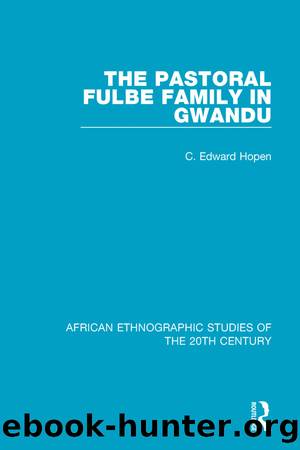The Pastoral Fulbe Family in Gwandu by C. Edward Hopen

Author:C. Edward Hopen [Hopen, C. Edward]
Language: eng
Format: epub
ISBN: 9781138594333
Barnesnoble:
Publisher: Taylor & Francis
Published: 2020-04-29T00:00:00+00:00
I love you from now until the day I die. If you were to kill me with a sword, or throw me into a well, I would still love you. However many suitors I may have, it is you whom I love and I will not allow them to marry me. It is you whom I wish to marry me.
At least one other suitor offered to marry Hajo with a higher tooshi than that offered by Umani. She was married to Umani.
Now since we have noted the conditions or circumstances in which high tooshi (roughly over £7) is paid, we should also mention that the middle range of payments (about £2 to £7) covers most marriages to comparatively young women. Finally, the lower range of tooshi (from a few shillings to about £2) is of some interest and calls for a few brief comments.
Low tooshi payments may be accepted, as we have seen, when the parents of the spouses are close kin; this, in the terminology of some FulÆe, is the so-called kogal wuro (âmarriage of the campâ). The low payment expresses the solidarity of the group involved in the marriage or the sentiments of affection between the parents of the spouses. The economic aspects of the union are minimized. As was noted earlier these marriages are comparatively infrequent today.
The greater proportion of low tooshi payments is found in those unions in which the women concerned suffer certain disabilities as prospective wives. Among these are older women who are near the menopause, women who are thought to be diseased, reformed prostitutes, barren women, women who are known to be promiscuous and those who are bad tempered, lazy, dirty, and so forth. Since such women have a low marriage value they are not in demand. Payments made for them have not much more than a token value and are made merelyâone might supposeâto conform to accepted social usage.
Finally, tooshi may be very low among the extremely poor. The suitor, or his representative, simply offers what he can afford. The tooshi and sadaaki may be only a few pence. The wedding is held in secret under the direction of a mallam who reads the fatiya in the presence of at least three witnesses. The reason for the secrecy is that people in such marriages are ashamed of their poverty and embarrassed that they are not able to entertain guests.
One other gift is given by or on behalf of the groom to his bride and is called the Æangarde (from the verb Æangaââto take a wifeâ). It is given to the bride when she comes to live in her husbandâs shelter. In 1954 the average value of the Æangarde was estimated to be in the region of from £2 to £4 although the price of some of the items in this gift vary locally and seasonally.
The Æangarde should contain one cloth (or two in the case of a brideâs first marriage), which may be of either local or foreign manufacture, together with one head-cloth and one pair of sandals.
Download
This site does not store any files on its server. We only index and link to content provided by other sites. Please contact the content providers to delete copyright contents if any and email us, we'll remove relevant links or contents immediately.
| Historic | Information Systems |
| Regional |
Man-made Catastrophes and Risk Information Concealment by Dmitry Chernov & Didier Sornette(4788)
The Revenge of Geography: What the Map Tells Us About Coming Conflicts and the Battle Against Fate by Kaplan Robert D(3614)
Zero Waste Home by Bea Johnson(3308)
COSMOS by Carl Sagan(2971)
In a Sunburned Country by Bill Bryson(2965)
Good by S. Walden(2932)
The Fate of Rome: Climate, Disease, and the End of an Empire (The Princeton History of the Ancient World) by Kyle Harper(2454)
Camino Island by John Grisham(2404)
A Wilder Time by William E. Glassley(2375)
Organic Mushroom Farming and Mycoremediation by Tradd Cotter(2319)
Human Dynamics Research in Smart and Connected Communities by Shih-Lung Shaw & Daniel Sui(2190)
The Ogre by Doug Scott(2135)
Energy Myths and Realities by Vaclav Smil(2078)
The Traveler's Gift by Andy Andrews(2026)
Inside the Middle East by Avi Melamed(1952)
Birds of New Guinea by Pratt Thane K.; Beehler Bruce M.; Anderton John C(1922)
Ultimate Navigation Manual by Lyle Brotherton(1778)
A History of Warfare by John Keegan(1734)
And the Band Played On by Randy Shilts(1635)
